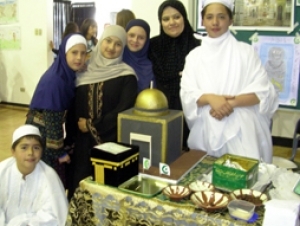It's not the first place you'd imagine encountering Muslims. But Ecuador has its own confident community.
A group of young women in hijab talk animatedly as they await the start of their weekly Islamic class. This is a scene that could easily be from a mosque in London, Cairo, Indonesia or New York. However, this is happening in Quito, the chatter is in Spanish and the ladies are all Ecuadorian.
Here in the heart of an overwhelmingly Catholic South America, an unmarked building in an affluent suburb in the centre of Ecuador's capital city provides a focal point for the country's few thousand Muslims. White walls, geometric designs, sumptuous furnishings and shelves arranged with Islamic literature complete the spacious interior of the Centro Islamico del Ecuador.
The reasons that brought these women to Islam are various and not dissimilar to those cited by converts in the UK. Maria Fernanda Novilla, a 29-year-old veterinary surgeon, took the declaration of faith, or shahada, at the Centro Islamico del Ecuador three years ago. Her conversion came after years of gradually learning about Islam. A curiosity, initially sparked by one of her university lecturers who happened to be Muslim, eventually brought her to the realisation that this was the path that seemed right for her.
Her parents were not thrilled, however, fearful that their daughter was joining a religion they knew little about and associated with terrorism. "Some members of my family are conservative Catholics" she explained, "so it was a shock and a worry for them. But three years later they are reconciled to my choice and broadly supportive. More importantly I have convinced them Muslims are not all terrorists."
Carla Celebioglu converted to Islam five years ago at the age of 26. At the time she had left Ecuador to study in New York and it was there that she met many Muslims and decided to find out more about their religion. "Being a Catholic for me had been about tradition. It was something my parents and grandparents did and you didn't question it. But I did have questions and while researching Islam I found answers to those questions."
Her family were in fact pleased with the change in her behaviour that the embrace of Islam inspired. "Before I had really been into partying but I became less hedonistic when I became Muslim which my parents were happy about." She describes their prevailing attitude to her faith as one of respectful tolerance.
Carla is emphatic that Muslims in Ecuador can open minds and fight ignorance by talking to people and educating them about Islam, not by being defensive or isolating themselves. "Since 9/11 people in Ecuador have been trying to learn more about Muslims and what we are about. We as Muslims should be the ones that reach out to people of other faiths or no faith in a way that is not preachy or lecturing."
The 17-year-old daughter of the centre's imam and founder Francisco Carrera has an altogether unique experience in that she is a second-generation Muslim Ecuadorian. Shahzady Suquillo describes growing up as a Muslim in Ecuador as "interesting". Being, for example, the only one among 500 students at her school to wear hijab is neither negative or positive, but simply how it is.
She draws parallels between Latin American culture and Muslim culture, such as the emphasis on hospitality. Differences in religious practice between herself and her Catholic friends and neighbours are tempered by the fact that the two religions belong to the family of monotheistic faiths and have much common ground. The current spotlight on Islam and Muslims leads to much curiosity. Shahzady sees this as an opportunity to inform and dispel myths.
With religion already an integral part of life in Ecuador, Shahzady explains that religious symbols such as the hijab are not politicised or perceived to be provocative, as is the case in France and other European countries. Wearing the hijab may invite some attention and there is always someone who assumes she is a nun but generally society and the government in Ecuador are relaxed about the issue.
Being an Ecuadorian Muslim need not cast a person outside the mainstream. Recently Shazady's father was invited by the National Assembly, along with representatives of other minority faiths, to discuss the religious privileges currently enjoyed by the Catholic church and the possibility of extending the law to cover all faiths, or abolishing privileges altogether so all religions are equal under the law.
Just as UK Muslims are seeking to establish a British Muslim identity, Muslim women in Ecuador are finding their place and their voice in a society eager to understand and accept.
By Guardian



